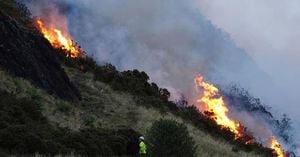Recent reports indicate rising cases of the human metapneumovirus (HMPV) across the Middle East, raising alarms about its potential impact on public health. Health officials express concerns due to the virus's resemblance to other respiratory diseases, prompting comparisons to the COVID-19 pandemic.
Dr. Darar Al-Balawi, an infectious disease consultant, highlighted the increasing attention on HMPV, stating, "It’s important to raise awareness of its symptoms and prevention methods to limit its spread and protect vulnerable groups," according to BBC Arabic. HMPV, first discovered in Holland in 2001, has become known as the second most common cause of acute respiratory infections since 2016 among children. Its symptoms, which can resemble those of respiratory syncytial virus (RSV) or influenza, have led to heightened vigilance.
HMPV predominantly affects younger children and the elderly, particularly those with compromised immune systems or chronic respiratory illnesses such as asthma. The infection typically results in mild symptoms similar to those of common colds—runny nose, cough, sore throat, and fever. Yet, it can escalate to severe lower respiratory infections, including pneumonia and bronchitis, necessitating hospitalization for high-risk groups.
The mode of transmission is significant: HMPV spreads via respiratory droplets from coughs and sneezes and can also contaminate surfaces, heightening the risk of spread. Dr. Al-Balawi noted the urgency of public health education around hygiene practices. He explained, "Good handwashing techniques and health habits, like avoiding contact with one's face and regular disinfection of frequently touched surfaces, are effective preventive measures."
Authorities have not yet deemed HMPV as globally epidemic; still, the situation is being closely monitored. Countries neighboring China have begun to watch reports of HMPV, especially as respiratory illnesses surge during winter. Mao Ning, the spokesperson for the Chinese Foreign Ministry, stated recently, "The situation is less severe and less widespread this year compared to last year," indicating some confidence amid rising cases.
Indonesia has responded proactively, issuing health advisories, including measures like the quarantining of travelers exhibiting flu-like symptoms. The Indonesian Ministry of Health has instructed citizens to adopt preventive steps, such as wearing masks and frequent hand washing. Conversely, Dr. Atul Goyal, Director General of Health Services for India, downplayed hysteria by stating, "We are continuously monitoring the situation; last year, there was no increase during December," reaffirming the stance of caution without alarm.
Health experts stress the importance of continuous surveillance and research to track HMPV's evolution. They urge individuals to practice good hygiene and remain informed about respiratory viruses, emphasizing protective measures to safeguard vulnerable populations from potential outbreaks.
Overall, the emergence of HMPV cases demands both awareness and preparedness. While the data suggests HMPV does not currently pose as severe as other respiratory illnesses, the potential for complications highlights the necessity of public health readiness. Close monitoring and adherence to health guidelines remain pivotal as experts track the virus's progress.



